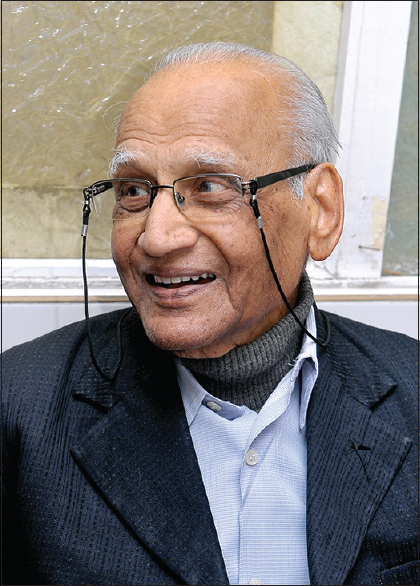
Dr. G.M. Taori, a pioneering neurologist, teacher, researcher, philanthropist, and founder of the Central India Institute of Medical Sciences (CIIMS), passed away at 4 am today in Nagpur’s CIIMS hospital, the very institution he built and led for over three decades. He was 83.
Dr. Taori is widely recognized for introducing neurology as a specialty to Central India in 1984. Coming from a farming family, he achieved the extraordinary feat of becoming the first neurologist in Nagpur, earning an FRCP from Canada in 1966. This was a groundbreaking achievement for the time. His next major accomplishment was founding CIIMS, Nagpur’s first dedicated hospital and research institute, which remains a beacon of medical excellence.
Born on June 1, 1932, in Paradsinga village near Sausar (MP), Dr. Taori’s upbringing was deeply influenced by his father, a freedom fighter and follower of Mahatma Gandhi. He completed his MBBS from the Government Medical College, Nagpur, in 1957, followed by a Master of Medicine in 1960. In 1966, he received his superspecialization fellowship in neurology (FRCP) from the Royal College of Physicians and Surgeons of Canada.
Dr. Taori’s career in neurology began in 1962 when he joined Christian Medical College (CMC) Vellore as a lecturer. His passion for neurology grew as he worked at several prestigious institutions, including the Montreal Neurological Institute in Canada. Returning to India, he worked as a Reader in Neurology at CMC Vellore before becoming a professor and continuing his work there. In 1973, he began serving as a visiting professor at the Mahatma Gandhi Institute of Medical Sciences (MGIMS) in Sevagram and continued to work at Gopalkrishna Neuro Clinic in Nagpur.
In 1984, he founded CIIMS, a state-of-the-art neurological hospital, and research institute in Nagpur. His vision for CIIMS was to provide advanced care to patients, particularly from economically disadvantaged backgrounds. Through his leadership, CIIMS became a world-class institution that treated many patients at subsidized cost. His commitment to the development of CIIMS was unwavering; he tirelessly sought support from bureaucrats, politicians, and philanthropists, even turning to spiritual leaders like Dongre Maharaj and Murari Bapu for donations.
Dr. Taori was known for his simplicity. He always wore a white shirt, untucked over plain white trousers, with ordinary chappals and a simple watch. For decades, he drove his old Fiat car, expertly manoeuvring it long past its prime. A frugal eater and a man of few words, he seldom socialized and almost never attended the grand lunches and dinners of medical conferences. A vegetarian and teetotaller, he was deeply religious and spiritual.
Beyond his personal simplicity, Dr. Taori was strict and disciplined. In his OPD, he upheld order with unwavering resolve—he would not tolerate any indiscipline, ensured patients followed the queue system, and treated everyone equally. He neither made a fuss over poor patients nor catered to the whims of the wealthy. He followed time to the letter and expected the same from his staff and patients.
But above all, his greatest passion was developing CIIMS into a world-class institution. His dedication extended beyond neurology; he was a philanthropist at heart, establishing the Gopalkrishna Taori Charitable Trust in memory of his late brother. Despite his success, he remained deeply committed to ethical practice. He set strict rules at CIIMS, ensuring that even the wealthiest donors followed the same protocols as other patients.
Dr. Taori’s contributions to research and teaching were as remarkable as his dedication to CIIMS. Even in his final days, when he was severely ill and confined to a wheelchair, he continued to oversee the institute’s operations from his hospital bed. His health had been deteriorating over the past few months—fifteen years earlier, he had undergone coronary artery bypass graft surgery, and over time, his heart weakened, leading to breathlessness and edema. A pacemaker was implanted, but the intervention failed, and his kidneys also began to fail, necessitating dialysis. Yet, even as his body faltered, his resolve remained unshaken. He continued to command the hospital from his bed, instructing staff, advising doctors, and making critical decisions for CIIMS. In his final week, he orchestrated a major deal for medical equipment, negotiating fiercely despite his rapidly worsening condition. Until the very end, his mind remained sharp, and his commitment to his life’s work never wavered.
When his time came, Dr. Taori faced the end with the same resolute spirit that had defined his life. Aware that the inevitable was near, he requested that no life-saving interventions be performed. He continued to guide the hospital staff, expressing gratitude for their care. In his final moments, he folded his hands, said “Namaste,” and chanted “Ram-Ram” before passing away peacefully at 4:30 a.m.
Dr. Taori’s contributions to the field of neurology and healthcare are immeasurable. He was not only a clinician and educator but also a visionary who built CIIMS from the ground up. His commitment to ethics, research, and patient care set a high standard for future generations. As he once shared in an interview, he lamented the decline of ethical standards in healthcare and the deterioration of research quality. For him, CIIMS was more than just a hospital—it was a lifelong mission, and he devoted every ounce of energy to its success.
His legacy lives on through CIIMS, which continues to provide exemplary neurological care to thousands of patients. Dr. Taori’s life was a testament to the power of dedication, discipline, and selflessness. May his soul rest in peace.